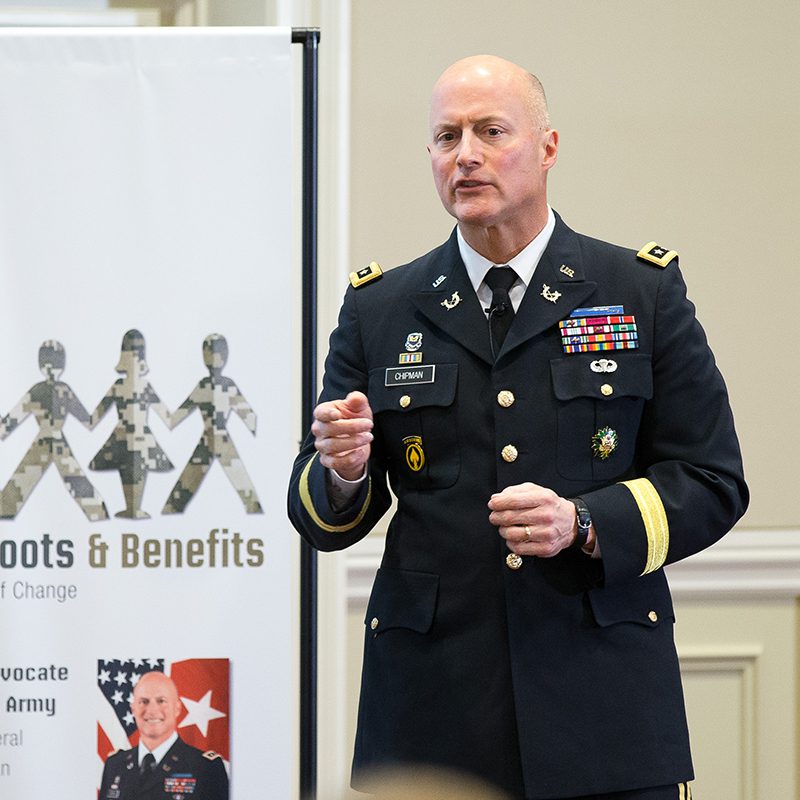Social change comes to U.S. military

For many years, social behavior in the military has been rigid and unchanged.
But this is changing, according to Lieutenant General Dana K. Chipman, the Judge Advocate General of the U.S. Army.
Chipman’s March 20 lecture, titled “Combat Boots and Benefits: Equality in an Era of Change” was sponsored by the Riley Institute. It explored women in combat, equal rights for gay Americans, religious accommodations for grooming and sexual assault.
Chipman has been the senior uniformed attorney in the army since 2009. He has served as a judge advocate in numerous operational and staff assignments and commanded the Judge Advocate General’s Legal Center and School in Charlottesville, Va. before assuming his current duties.
Chipman discussed the decision to allow women to serve in direct combat that passed on January 24. The availability of qualified female personnel motivated the change in policy. In recent years, there have not been as many people qualified to serve in the army, and as Chipman put it, they decided to maximize their talent.
“It was motivated by the fundamental fairness of the issue. If you can meet the standards, you can serve,” he said.
Chipman’s personal stance on the policy was less practical.
“It’s a tough thing for me, as a father, to think about,” he said.
The U.S. Department of Defense has until January 2016 to evaluate if any areas, including occupations and specialty schools, should remain closed to women. The U.S. Army Ranger School is not yet open to women, but Chipman predicted that it would be soon.
Chipman called the repeal of Don’t Ask Don’t Tell in 2011 a “non-event.”
“People thought it was going to be a cathartic change, an upheaval of massive social proportions. It’s been a non-event,” he said.
He attributed the lack of backlash to the awareness and open-mindedness of the younger generation.
Chipman said he expects that the Defense of Marriage Act, which does not recognize same-sex marriage, will be repealed, and said that it is the main obstacle that remains to equal rights for gay Americans.
He cited a recent poll in the Washington Post as evidence, where 81 percent of those recently surveyed were in favor of same-sex marriage. Oral arguments for the Defense of Marriage Act were heard at the Supreme Court on Wednesday, where the justices asked the lawyers of the case questions of their choosing.
Religious accommodation has been made for articles that are worn beneath the uniform, such as a yarmulke worn under a helmet. Policies become complicated if the grooming practice, such as having a beard, affects the external uniform.
Chipman said five requests have been granted, with two Orthodox Jewish soldiers and two Muslim soldiers allowed to wear beards and one female soldier allowed to wear a hijab, or Muslim head scarf.
Chipman said her case has been revised due to opposition from other officers, and she is only allowed to wear the scarf in certain wings of the Pentagon. He said that this is not a good personnel policy and a more sensible solution will need to be found.
Chipman highlighted sexual assault as the biggest issue facing personnel policies. There were an estimated 19,000 sexual assault cases across the department of defense from the past year, with only 3,000 of those cases officially reported. Most sexual assault cases occur in the first 90 days of service within the 18-25 age group and involve binge drinking.
During the first months of training, the idea of the army as a unified team is hammered into the minds of the soldiers. Chipman was saddened as he spoke of the victims of assault who were promised that their team would look out for them. He said the policies that address sexual assault focus more on the response to the case than prevention. He disagrees with this approach.
“It is the responsibility of the chain of command to shape the environment,” he said.
Bystander intervention needs to be encouraged during training, as well as teaching methods to report offenses.
“We’ll fail if we don’t confront it.”